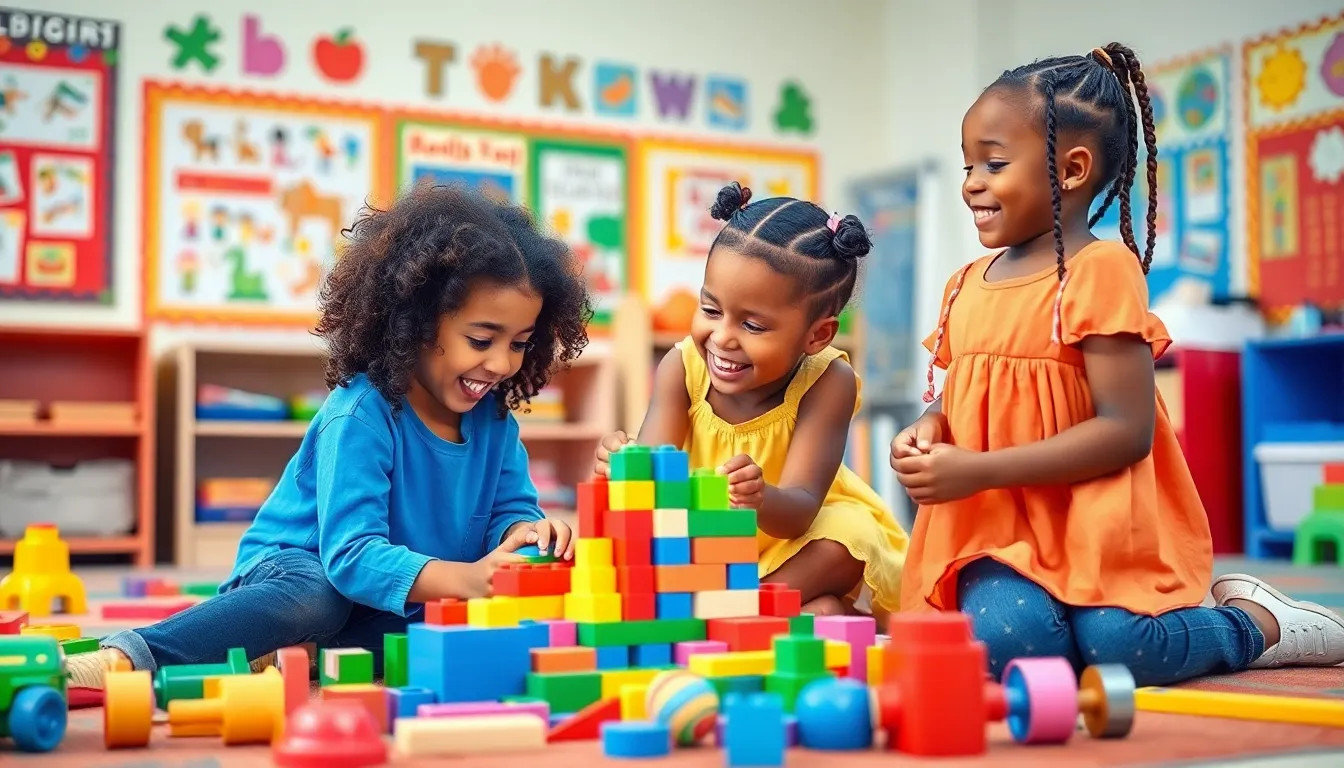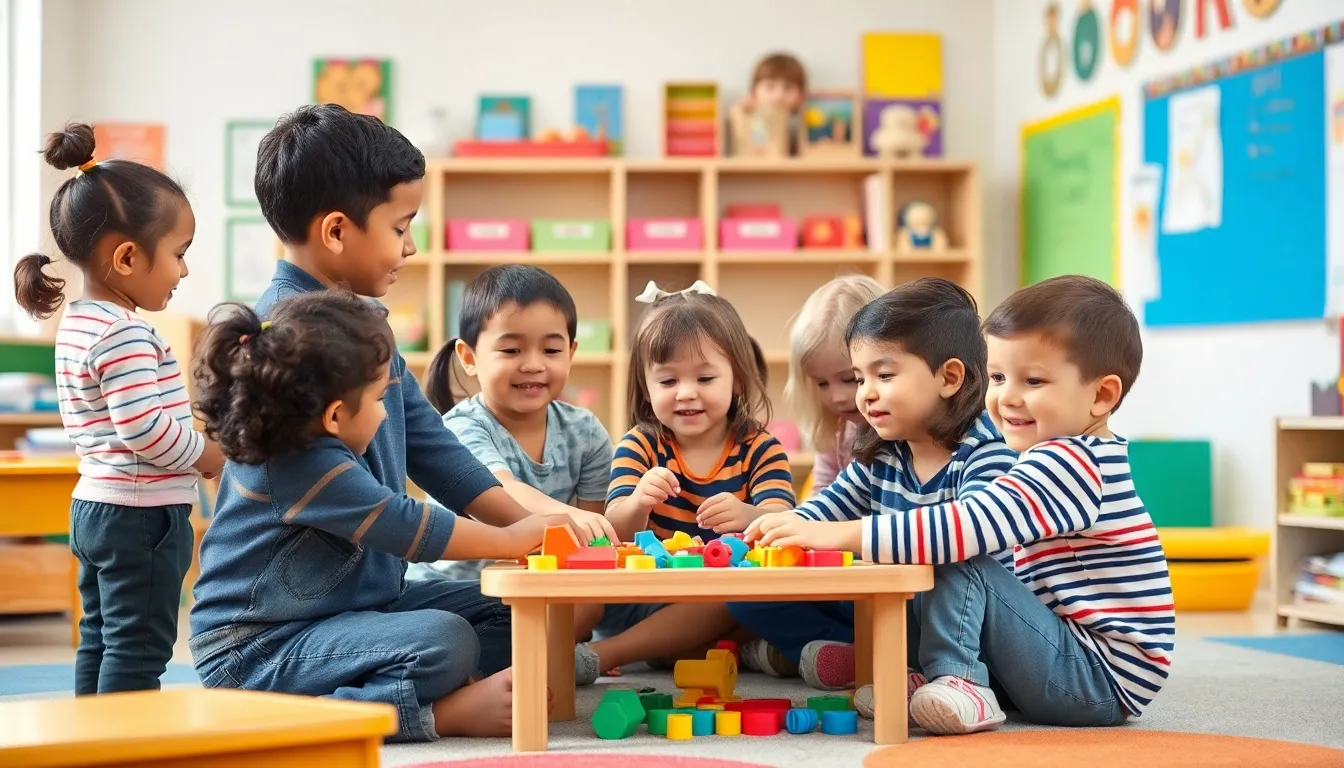As the first day of school approaches, parents often find themselves in a whirlwind of emotions. Excitement, anxiety, and a sprinkle of panic can make anyone question if their little one is truly ready for the big leagues. School readiness skills are the secret sauce that turns a wide-eyed toddler into a confident classroom superstar.
Table of Contents
ToggleUnderstanding School Readiness Skills
School readiness skills refer to the essential abilities and knowledge that prepare children for a successful start in school. These skills encompass various developmental areas, including social, emotional, cognitive, and physical growth.
Definition of School Readiness Skills
School readiness skills include a range of competencies crucial for early learners. Social skills involve sharing, taking turns, and cooperating with peers. Emotional skills encompass managing feelings and expressing needs appropriately. Cognitive skills involve basic literacy and numeracy concepts, promoting problem-solving abilities. Physical skills highlight fine and gross motor abilities, essential for daily tasks like writing and playing. Altogether, these skills ensure children can adapt to the classroom environment.
Importance of School Readiness Skills
School readiness skills significantly impact a child’s academic journey. Children equipped with these skills tend to experience smoother transitions into formal education. Research indicates that students with strong school readiness skills exhibit improved social interactions and academic performance. Early development of these abilities fosters a sense of independence and boosts confidence. These attributes not only benefit children academically but also enhance their overall quality of life. Supporting the development of school readiness skills leads to lasting advantages throughout a child’s educational experience.
Key Components of School Readiness Skills
School readiness skills encompass various domains essential for a child’s successful entry into school. These skills include social and emotional skills, language and communication skills, cognitive skills, and physical and motor skills.
Social and Emotional Skills
Social and emotional skills form a foundation for peer interactions. Children learn to share, take turns, and cooperate during group activities, fostering strong relationships. They manage feelings and express emotions in healthy ways, which enhances their ability to adapt to new environments. Support from caregivers and educators promotes resilience. These skills contribute to a positive classroom atmosphere, ensuring children engage fully with their learning experiences.
Language and Communication Skills
Language and communication skills enable children to articulate thoughts and participate in discussions. A robust vocabulary helps express needs and desires effectively. Children grasp basic literacy concepts, including letter recognition and phonemic awareness. Encouragingreading and storytelling enhances comprehension skills. Listening abilities also significantly impact how they follow instructions and engage with peers. Strong communication sets the stage for academic success and collaboration.
Cognitive Skills
Cognitive skills revolve around problem-solving and critical thinking abilities. Engaging in play-based learning activities stimulates curiosity and reasoning. Children learn to categorize, compare, and contrast objects, developing their analytical skills. Early exposure to numbers and basic math concepts lays the groundwork for later mathematical proficiency. These cognitive skills help children make connections across subjects, promoting comprehensive learning.
Physical and Motor Skills
Physical and motor skills encompass both fine and gross motor abilities. Children develop hand-eye coordination through activities like drawing and cutting. Gross motor skills improve through running, jumping, and climbing, enhancing overall physical health. Participation in structured play, such as sports, promotes teamwork and discipline. Mastering these skills contributes to confidence and independence, crucial for navigating the school environment.
Assessing School Readiness Skills
Assessing school readiness skills involves evaluating a child’s development across several domains. Parents and educators can utilize various tools and methods to gain insights into a child’s readiness for school.
Tools and Methods for Assessment
Standardized assessments, observational checklists, and developmental screenings serve as effective tools. Standardized assessments offer quantifiable data regarding literacy and numeracy skills. Observational checklists allow adults to document behaviors and milestones during play or structured activities. Developmental screenings provide professional evaluations, ensuring children meet appropriate age benchmarks. Educators can also engage in conversations with parents, gathering additional context and insights.
Identifying Areas of Strength and Weakness
Identifying a child’s strengths involves recognizing competencies in social, emotional, cognitive, and physical domains. During assessments, caregivers can observe how well children interact with peers and express emotions. Noticing a child’s confidence in problem-solving tasks indicates cognitive strengths. Areas needing improvement may include difficulties with sharing or following instructions. By pinpointing specific skills requiring attention, adults can better support the child’s growth and development, ensuring readiness for school challenges ahead.
Supporting the Development of School Readiness Skills
Supporting school readiness skills requires a collaborative effort between parents, educators, and the community.
Role of Parents and Caregivers
Parents and caregivers play a critical role in developing essential school readiness skills. They can model appropriate social behaviors, such as sharing and cooperating during play. Encouraging open communication allows children to articulate their thoughts and feelings effectively. Involvement in daily activities helps build a foundation for cognitive and motor skills, while nurturing resilience and emotional regulation. Engaging in structured routines provides predictability, fostering independence. By observing their child’s interests, parents can tailor experiences that align with their developmental needs.
Educational Programs and Strategies
Educational programs targeted at early learners support the development of school readiness skills effectively. Play-based learning encourages problem-solving and critical thinking in a fun and engaging manner. Structured activities that focus on literacy and numeracy concepts enhance children’s foundational skills. Programs emphasizing social interactions provide opportunities for peer collaboration. Educators can also utilize individualized assessments to tailor strategies that support diverse learning styles. By integrating movement-based activities, physical and motor skills become a focus, promoting overall health.
Community Resources
Community resources can supplement the development of school readiness skills significantly. Libraries often offer storytime sessions that encourage language development and a love for reading. Local parenting workshops provide valuable insights into nurturing children’s skills at home. Community centers may host playgroups that foster social skills among peers. Access to early childhood education programs helps bridge gaps in learning opportunities. Collaboration between schools and local organizations creates an environment where children thrive, ensuring their readiness for the challenges of school.
Conclusion
Fostering school readiness skills is crucial for a child’s successful transition into formal education. These skills lay the groundwork for effective social interactions and academic achievement. By nurturing emotional, cognitive, and physical development, parents and educators can significantly impact a child’s confidence and independence in the classroom.
Collaboration among families, schools, and communities creates a supportive environment that enhances children’s readiness. Investing time in play-based learning and engaging activities not only prepares children for school but also enriches their overall development. As children acquire these essential skills, they’re more likely to thrive academically and socially, setting the stage for lifelong learning and success.





